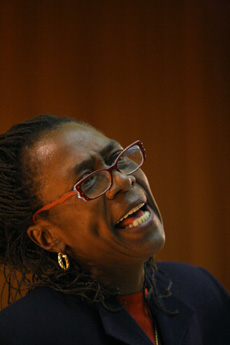Tupac’s mother shares legacy of late son

Afeni Shakur, mother of the late artist Tupac Shakur, speaks at Foellinger on Sunday afternoon for the Alpha Phi Alpha´s 20th Annual Ritual Ceremony. Josh Birnbaum
Oct 31, 2005
Last updated on May 11, 2016 at 11:12 p.m.
Afeni Shakur, mother of the late legendary West Coast rapper Tupac Shakur, spoke to a crowd of more than 100 people about motivating blacks to be more active in their communities at Foellinger Auditorium Sunday afternoon.
Shakur came to the University as the keynote speaker for the Alpha Phi Alpha Fraternity’s 20th Annual Ritual, an event aimed at strengthening the black community. The theme for this year’s Ritual was “The Black Experience.”
“I am not an entertainer,” she said. “I am only somebody’s mom.”
Shakur began by singing words from a biography written about her.
Get The Daily Illini in your inbox!
“We who believe in freedom shall not rest,” she sang.
Shakur, 58, asked the audience whether or not they had noticed “how bad things are in the world.” Some students throughout the presentation vocally agreed with her, as though she were preaching.
“Things are worse than you think,” she said.
Throughout her speech, Shakur emphasized that young blacks need to act for themselves. She said that it was unfair for them to blame others for their problems- they should take responsibility and act accordingly. Referring to Hurricane Katrina, she said that blacks should not have been dependent on others to solve their problems.
“Martin Luther King Jr. and Rosa Parks took responsibility,” she said. “All we do is point fingers.”
She told members of the audience that they should help each other.
“Are you gonna be a victim or are you gonna be a helper?” Shakur asked the crowd.
Born in North Carolina, Shakur’s real name is Alice Faye Williams. She moved to New York when she was 11, and later became a prominent member of the Black Panthers, a black nationalist organization.
While a member of the Black Panthers, she was charged with 151 felonies, along with other members of the party. She was released from prison only one month before the birth of her son, Tupac.
Addressing a crowd composed mostly of black men and women, she reminded them why they were there.
“We are here to celebrate our great blackness, our great African-ness,” she screamed out to the audience when her microphone had broken, her voice loud enough to fill the auditorium and echo on the walls.
She demanded that young blacks “drop back in, take over any political system you can.” She insisted that they “be elected to something.”
Jeremy Farmby, senior in Communications and a member of the Alpha Phi Alpha Fraternity, explained that Shakur made him “want to be more active,” and to show other blacks “that problems from before are still the same problems now.”
Shakur told the audience not to wait for anyone to help them. Showing how much her son had done in his life, she urged the young blacks present to do more than him.
“I want you to be fearless, to have an attitude about everything,” she said.
Her biography came out in February, and, in June, she opened up the Tupac Amaru Shakur Foundation, which allows students to explore their creative talents.
Addressing questions presented to her about violence, she urged the students to “bring back the strength of non-violence.” Never follow people who ask you to hate, Shakur said.
Sherrika Ellison, an admissions counselor at the Office of Admissions and Records, said Shakur’s words motivated her.
“Everything she talked about excited me,” Ellison said. “I would like to open up my own performing arts center.”
When asked by one student about what her son’s legacy was, Shakur responded quickly with emotion in her voice.
“Tupac’s legacy is about hope,” she said.
Shakur said her son’s legacy teaches people to “get up … and do something.”
Shakur, voice shaking and arms in the air, pleaded with her viewers, telling them, “you can change the discussion, and that’s really what I’m begging you to do.”





